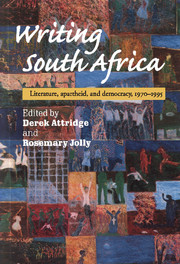Book contents
- Frontmatter
- Contents
- Contributors
- Acknowledgements and note on references
- South Africa, 1930–1996: a chronology
- Maps
- 1 Introduction
- 2 Interrogating silence: new possibilities faced by South African literature
- 3 I am dead: you cannot read: André Brink's On the Contrary
- 4 Endings and new beginning: South African fiction in transition
- 5 The post-apartheid sublime: rediscovering the extraordinary
- 6 Postmodernism and black writing in South Africa
- 7 Shame and identity: the case of the coloured in South Africa
- 8 A man's world: South African gay writing and the State of Emergency
- 9 The final safari: on nature, myth, and the literature of the Emergency
- 10 Interview
- 11 Speech and silence in the fictions of J.M.Coetzee
- 12 ‘Dialogue’ and ‘fulfilment’ in J.M. Coetzee's Age of Iron
- 13 Interview
- 14 Inside out: Jeremy Cronin's lyrical politics
- 15 Spinning out the present: narrative, gender, and the politics of South African theatre
- 16 South African theatre in the United States: the allure of the familiar and of the exotic
- Position papers
- Select bibliography: South African literary writing in English, 1970–1995
- Index
4 - Endings and new beginning: South African fiction in transition
Published online by Cambridge University Press: 05 July 2011
- Frontmatter
- Contents
- Contributors
- Acknowledgements and note on references
- South Africa, 1930–1996: a chronology
- Maps
- 1 Introduction
- 2 Interrogating silence: new possibilities faced by South African literature
- 3 I am dead: you cannot read: André Brink's On the Contrary
- 4 Endings and new beginning: South African fiction in transition
- 5 The post-apartheid sublime: rediscovering the extraordinary
- 6 Postmodernism and black writing in South Africa
- 7 Shame and identity: the case of the coloured in South Africa
- 8 A man's world: South African gay writing and the State of Emergency
- 9 The final safari: on nature, myth, and the literature of the Emergency
- 10 Interview
- 11 Speech and silence in the fictions of J.M.Coetzee
- 12 ‘Dialogue’ and ‘fulfilment’ in J.M. Coetzee's Age of Iron
- 13 Interview
- 14 Inside out: Jeremy Cronin's lyrical politics
- 15 Spinning out the present: narrative, gender, and the politics of South African theatre
- 16 South African theatre in the United States: the allure of the familiar and of the exotic
- Position papers
- Select bibliography: South African literary writing in English, 1970–1995
- Index
Summary
In a letter written in 1920 Solomon Plaatje remarks that he had just completed ‘a novel – a love story after the manner of romances; but based on historical facts’. It would be: ‘Just like the style of Rider Haggard when he writes about the Zulus’ (Willan, Sol Plaatje, 254). A linguist, historian, nationalist, and founding member of the South African Native National Congress (later the ANC), Plaatje straddled cultural worlds. His novel Mhudi (1930), the first work of fiction by a black African to be published in English, itself represents a curious mix – more exploratory in form and as fantastical in conception as the tales of Haggard. Embracing Tswana oral tradition and Shakespearean vocabulary, epic battlefield scenes and romance, speeches of biblical gravity and slapstick tussles with lions, Mhudi also looks two ways in time: back to the nineteenth-century wars of the Mfecane, and – as Halley's comet blazes in the sky – to the future and its risks, the danger of deals made between Africans and Afrikaners.
At this time of massive shift and change in South Africa, for which Plaatje did his share of preparation, innovative early writing like Mhudi invites another look. In particular the multilayeredness created by Plaatje's variations of voice and register contrasts noticeably with the sense of hesitation, restraint, in some cases of delimitation, expressed both at stylistic and thematic levels in more recent late-apartheid South African fiction. in Mhudi a suggestive dissonance carries right through to the ending, which is double.
- Type
- Chapter
- Information
- Writing South AfricaLiterature, Apartheid, and Democracy, 1970–1995, pp. 43 - 56Publisher: Cambridge University PressPrint publication year: 1998
- 21
- Cited by



